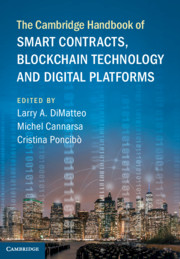Book contents
- The Cambridge Handbook of Smart Contracts, Blockchain Technology and Digital Platforms
- The Cambridge Handbook of Smart Contracts, Blockchain Technology and Digital Platforms
- Copyright page
- Dedication
- Summary of Contents
- Contents
- Contributors
- Preface
- Part I General Framework
- Part II Contract Law and Smart Contracts
- Part III Electronic Platforms and Networks
- Part IV Privacy, Security and Data Protection
- Part V Smart Contracts
- Part VI Future of Smart Contracts, Blockchain and Artificial Intelligence
- 17 Smart Transactional Technologies, Legal Disruption, and the Case of Network Contracts
- 18 Observations on the Impact of Technology on Contract Law
17 - Smart Transactional Technologies, Legal Disruption, and the Case of Network Contracts
from Part VI - Future of Smart Contracts, Blockchain and Artificial Intelligence
Published online by Cambridge University Press: 25 October 2019
- The Cambridge Handbook of Smart Contracts, Blockchain Technology and Digital Platforms
- The Cambridge Handbook of Smart Contracts, Blockchain Technology and Digital Platforms
- Copyright page
- Dedication
- Summary of Contents
- Contents
- Contributors
- Preface
- Part I General Framework
- Part II Contract Law and Smart Contracts
- Part III Electronic Platforms and Networks
- Part IV Privacy, Security and Data Protection
- Part V Smart Contracts
- Part VI Future of Smart Contracts, Blockchain and Artificial Intelligence
- 17 Smart Transactional Technologies, Legal Disruption, and the Case of Network Contracts
- 18 Observations on the Impact of Technology on Contract Law
Summary
The author examines the impact of blockchain and smart contracts on the legal profession. After all, the lawyer is entitled to draft smart contracts. For a few years now, in information technology, the lawyer has promoted the writing of so-called agile contracts in connection with projects run by “agileȁ methods. However, the smart contract, whether described as a contract or simple algorithm, challenges the lawyer by its philosophy (“code is law”) and by its writers who are no longer jurists but developers. He discusses whether this technology will be “killing off” the legal profession. Before over-hastily assuming this apocalyptic demise of the lawyer, the author suggests to think about the role and the status of the lawyer in his general mission of advice and defense, and considers whether information technology can be a substitute for the lawyer or simply a new tool that could be used.
Keywords
Information
- Type
- Chapter
- Information
- The Cambridge Handbook of Smart Contracts, Blockchain Technology and Digital Platforms , pp. 313 - 333Publisher: Cambridge University PressPrint publication year: 2019
